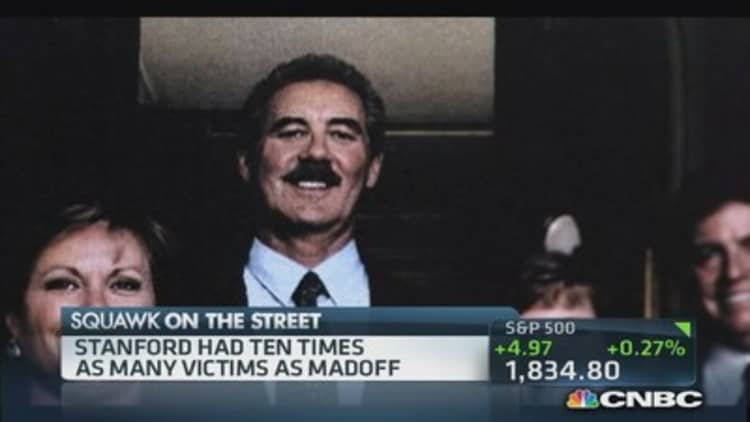Jailed financier R. Allen Stanford, convicted in 2012 of running a massive global Ponzi scheme that rivals the Madoff scandal, says he is the victim of an illegal prosecution, and "the clearest of assaults on the U.S. Constitution."
The comments come in Stanford's formal appeal of his conviction, filed in federal court on Wednesday. Stanford wrote the appeal himself at the prison in Florida where he is serving a 110-year sentence. Having fired the last of a string of court-appointed attorneys, and with no funds to hire a replacement, he is representing himself even though he has no legal background. He has also asked to argue his case in person before the Fifth Circuit Court of Appeals in New Orleans, a task normally handled by experienced attorneys.
Stanford calls the case against him a "reckless action," and accuses authorities of a "by-any-means pursuit" of him to cover up their missteps in the still-unfolding financial crisis.
Read More Five years after Stanford scandal, many victims penniless
Stanford, once listed by Forbes as the 205th richest American, was convicted of running a $7 billion scam based on bogus certificates of deposit issued by his offshore bank in Antigua. Prosecutors alleged he skimmed much of the money to fund his lavish, jet-setting lifestyle. To date, only about $70 million has been returned to investors, or about one penny on the dollar.
In his appeal, Stanford writes that his prosecution, which began with a civil action by the Securities and Exchange Commission in 2009, violates both U.S. and international law.
"(T)he SEC asserted its regulatory authority over the foreign-domiciled and foreign-regulated Stanford International Bank based on jurisdiction it did not have and charges it could not substantiate," he writes.
Still smarting from the Madoff scandal revealed two months earlier, the SEC moved in February of 2009 to shut down Stanford's global operations. Criminal charges against Stanford and four others eventually followed, and Stanford's entire fortune—once estimated at more than $2 billion—was frozen. Stanford himself has been behind bars since his indictment in June 2009.
The filing alleges multiple violations of his constitutional rights, which Stanford says should result in this conviction being reversed, or at least a new trial.
Read More Madoff son's death adds complication for victims
The 170-page filing bears the look and feel of a professional legal brief, complete with citations of case law ranging from an 1865 dispute over bank deposits to the 2006 prosecution and appeal of former Enron CEO Jeffrey Skilling. But the process of drafting and filing the brief has been anything but normal, proving that one thing the former tycoon is sorely lacking in prison is an editor.
His first draft, submitted to the Fifth Circuit Court of Appeals in September, was nearly five times the court's normal limit of 14,000 words. The court eventually agreed to let him file a 30,000-word brief, and extended the deadline to this week.
All the while, Stanford's 28,000 investors have been tensely waiting. Among their largest potential sources of recovery is some $300 million in international assets that remain frozen pending his appeal.
There is also some concern among the victims that one of Stanford's key arguments in his appeal—that the SEC lacked jurisdiction—could be enough to win him a new trial. And that, the victims say, is the SEC's own fault.

Stanford argues the CDs at the heart of his case are not securities under the law, but rather debt obligations issued by a foreign bank. He cites a ruling by a federal appeals panel earlier this year in the SEC's unsuccessful attempt to force the Securities Investor Protection Corporation (SIPC) to compensate Stanford investors. The SEC chose not to appeal the ruling, infuriating the victims.
Read More Court denies payout to Ponzi scheme victims
"Insult added to injury doesn't begin to describe how Stanford victims view the SEC's involvement in this case," Stanford Victims Coalition founder Angela Shaw Kogutt said in a statement Sept. 5, noting that the agency had overlooked the fraud for more than a decade before finally taking action. The victims argue that because the CDs were sold by Stanford's U.S. brokerage, they qualify as securities.
The Justice Department is expected to file its response to Stanford's appeal by mid-November. A ruling could still be months if not years away.


